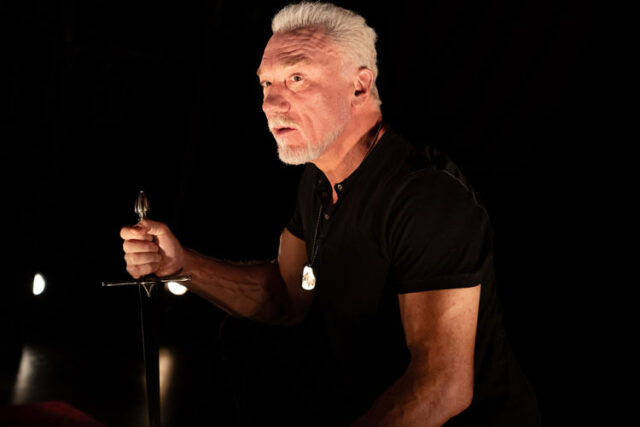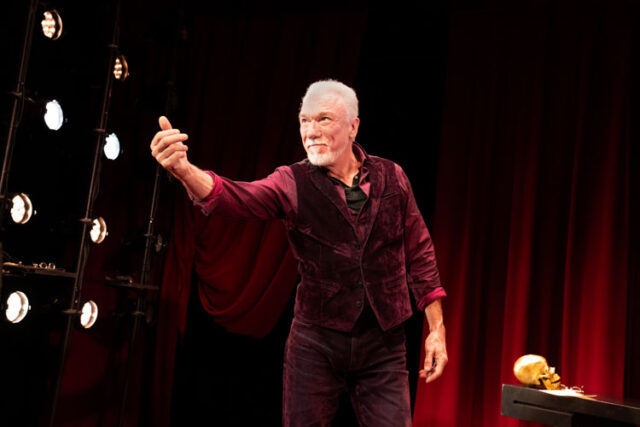
Patrick Page explores the history of villainy in Shakespeare’s plays in captivating one-man show at DR2 (photo by Julieta Cervantes)
ALL THE DEVILS ARE HERE: HOW SHAKESPEARE INVENTED THE VILLAIN
Daryl Roth Theatre
103 East 15th St. between Irving Pl. & Park Ave.
Tuesday – Sunday through March 31, $110-$160
allthedevilsplay.com
In May 2021, Tony nominee Patrick Page presented a streaming version of his one-man show All the Devils Are Here: How Shakespeare Invented the Villain, recorded in Shakespeare Theatre Company’s empty Sidney Harman Hall in DC. At the time, I wrote, “Page knows what of he speaks; in addition to having portrayed his fair share of Shakespeare baddies, he has played Scar in The Lion King, Scrooge in A Christmas Carol, the Green Goblin in Spider-Man: Turn Off the Dark, Hades in Hadestown, and the Grinch in Dr. Seuss’s How the Grinch Stole Christmas, villains all in one form or another. His command of Shakespeare and the concept of evil is bold and impressive, but he is down-to-earth enough to throw in plenty of surprising modern-day pop-culture references to keep it fresh and relevant to those who might not know much about the Bard or Elizabethan theater.” His bravura performance provided a vital dose of theater to the drama-starved during the lockdowns, and I named it Best Solo Shakespeare Play in twi-ny’s third Pandemic Awards.
He has now brought the show to the Daryl Roth Theatre in Union Square, adapting it for a live audience in the intimate space that seats a mere ninety-nine people. Arnulfo Maldonado’s set features a desk and a chair in front of a red curtain, with various props stored on lighting scaffolds on either side of the stage. Primarily dressed in a red velvet outfit with a vest (the costumes are by Emily Rebholz, with chilling lighting by Stacey Derosier and sinister sound by Darron L West), Page makes only minor garment changes and uses minimal props, including a skull, a dagger, a book, and other items, as he portrays Lady Macbeth (Macbeth), Richard of Gloucester (Richard III), Shylock (The Merchant of Venice), Malvolio (Twelfth Night), Claudius (Hamlet), Angelo (Measure for Measure), Iago (Othello), and other villainous Shakespeare creations. He connects the development of these evildoers to Shakespeare’s own maturation as a playwright, comparing Barabas from Christopher Marlowe’s The Jew of Malta to Aaron the Moor from Titus Andronicus. Exploring the mindset of psychopaths, Page draws a through line among the characters.
“Think of it: It’s a superpower!” he proclaims. “You might become a wizard on Wall Street or an Academy Award–winning producer. You might even become president of the United States. That is a psychopath.”
Page regularly drops in contemporary references, from Facebook and House of Cards to Succession and Uma Thurman as well as a bit of juicy gossip about the Bard.
With his deep, resonant voice and buff body, Page is a mesmerizing performer; it’s easy to be carried away by his imposing stage presence, and the audience’s trust in him is well placed. Simon Godwin, the artistic director of Shakespeare Theatre Company, previously directed Page as King Lear and expertly lets him strut his stuff in All the Devils Are Here as Page delivers a master class in villainy.

Patrick Page beckons the audience to join him on a unique Shakespeare ride in All the Devils Are Here (photo by Julieta Cervantes)
At a talkback after the show I saw, I asked Page about how he adapted the streaming film into the current live play. He responded, “A one-man show is already such a strange thing for an actor because acting is by its very nature a reciprocal process. You really are a reactor. You don’t generate a lot of stuff when you’re in a play with people. You’re simply reacting, listening, reacting, listening, reacting, listening, reacting. So in a one-man show, it’s different. With no audience, of course, you have to make up a lot in your imagination of what might be going on. Now I still have to make up some, but at least you’re there.
“So I feel the vibrations, I feel the energy, I feel the listening, I hear the laughs (as much as I can hear), and that you become my acting partner in the show. And my overall objective, of course, is to communicate this story to you as clearly as I can. And it’s very, very helpful to have someone there listening and thinking, you know, how you would tell a story differently to different people. And so I’m aware that there are people in the audience who have, let us say, a depth of experience with Shakespeare. I’m aware that there are people who’ve had very little experience with Shakespeare. I’m aware that there are people who have had only bad experiences, which many of us have had. It’s likely that you have had bad experiences. And someone tried to get you to read King Lear when you were in high school and, of course, it was completely indecipherable, never meant to be read in that way. So I’m aware of that as I’m telling the story. And that’s part of what animates it.”
With humor and gravitas, Page (Coriolanus, Cymbeline, Casa Valentina, Spring Awakening) deepens our experience of Shakespeare, offering a gift that will stay with you as you continue on your personal adventures with the Bard.
[Mark Rifkin is a Brooklyn-born, Manhattan-based writer and editor; you can follow him on Substack here.]